THE DOUBLE G CAMP
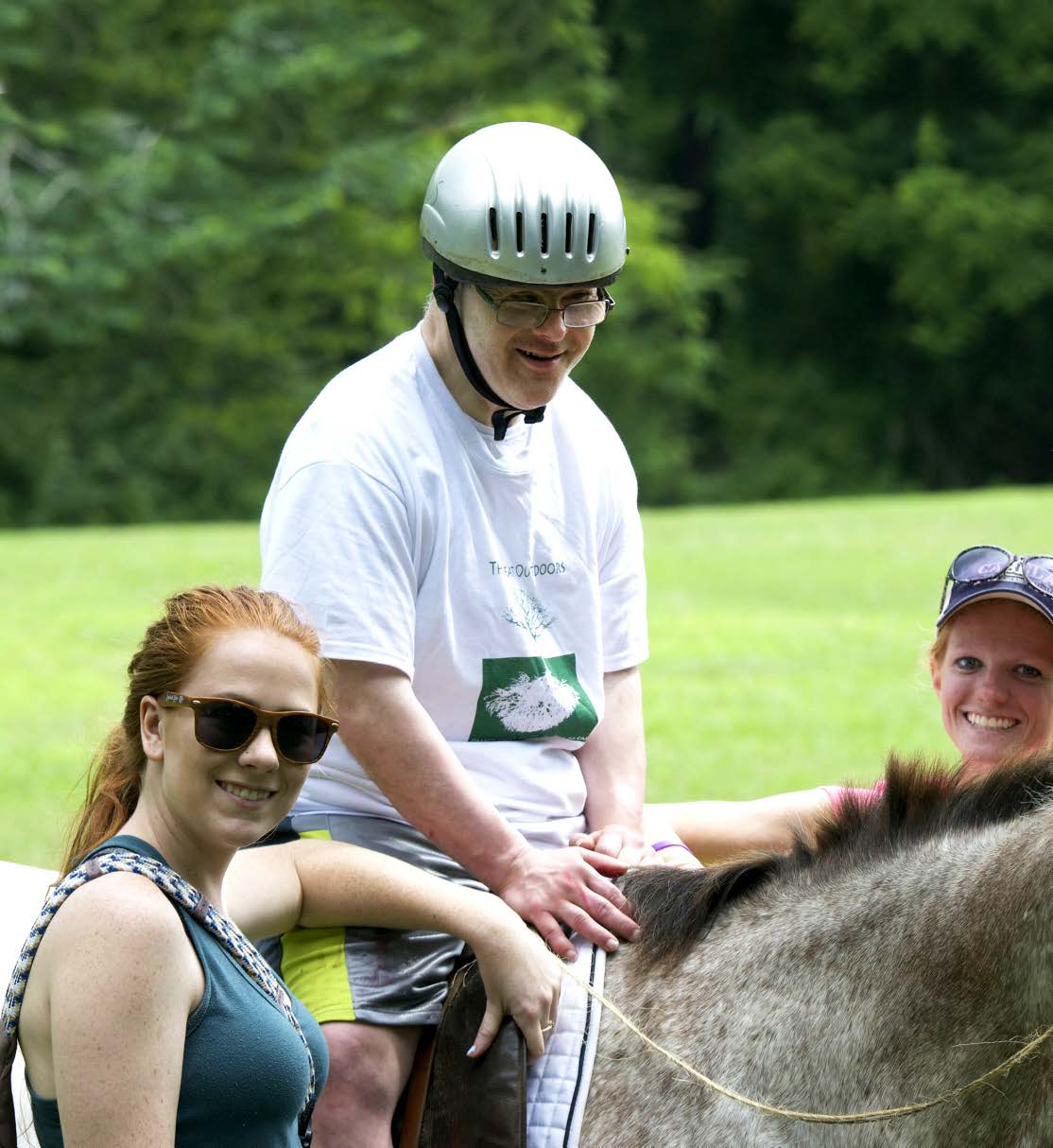
BACK IN THE SADDLE: "While all necessary precautions are taken for the health and safety of all participants, there are no lines of distinction based on abilities. We are all in the week together and relationships are the order of the day."
FROM YOUR HOME TO ANOTHER
BY HAL BAKER
"The Double G Camp was named after the family members who owned the camp grounds and generously provided it to the Orange Grove Center. So while the Double G did not stand for Growth and Gratitude, that is exactly what happened at the camp year after year. Both the campers and the counselors grew in so many ways and expressed gratitude to each other for the opportunity and experience." – Rick Rader, MD, Editor in Chief, EP Magazine
PHOTOS COURTESY DENNIS WILKES PHOTO COLLECTION
The Orange Grove Center's (Double G Camp) residential camp began in the 1950's for children and youth and offered two sessions of two weeks each for 48 boys and 48 girls under the watchful eyes and friendships of half as many young counselors. During the decades, as the children became adults, needs changed, and the number of campers declined to 60 men and women for a one-week session, still under the watchful eyes and friendships of half as many counselors, some, the children and grandchildren of counselors from years past. At least one camper had attended all previous sessions, 62 years.
Double G has become a legacy camp in our community. The facilities have not changed much since the camp was developed in 1958 to give children with diabetes a summer experience with the support they needed. There is no running water or air conditioning in the cabins, and the bathrooms are up a hill. Yet, there is a fondness for the place shared equally by campers and counselors alike.
It goes without saying that there are all sort of fun activities during the week that are pretty standard fare in residential summer camps across the country. What occurs however between the activities, are the relationships that develop between campers and counselors. We can't pretend that an objective for the camp when it was started was to be an inclusive setting for individuals with/with out IDD – but what has evolved over the years is a group of people with and without special needs cavorting together for a week in a camp setting, all day and every night. Everyone eats together, swims together, fishes together, and stays in cabins together.
The number of young counselors who have been a part of this experience over the years are in the thousands, and many have stayed connected, even currently serving on the volunteer Board of Directors. Throughout our community, there is an alumni of counselors who remember fondly their week or weeks as a member of the group, and still promote the camp whenever there is an opportunity, and are quick to point out the how the relationships developed there have affected their lives in a positive way. Many counselors are second and third generation participants, and the campers have returned year after year to develop new relationships with them.
The camp is tradition plus inclusion in the same manner of the unified sports of Special Olympics. While all necessary precautions are taken for the health and safety of all participants, there are no lines of distinction based on abilities. We are all in the week together and relationships are the order of the day. At the end of the week, there are heartfelt good byes and expectations of meeting again next year.
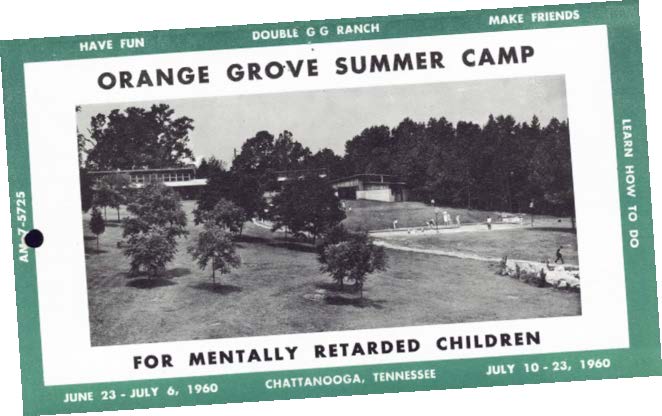
SO HAPPY TOGETHER: What has evolved over the years is a group of people with and without special needs eating, swimming, fishing, and staying in cabins together.
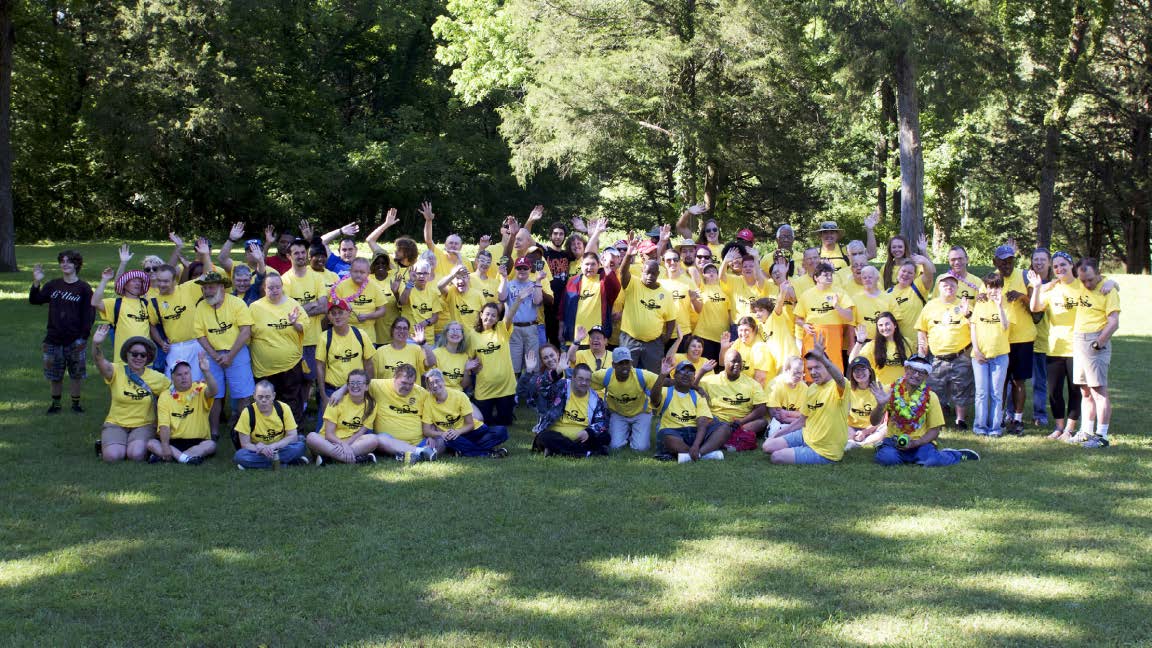
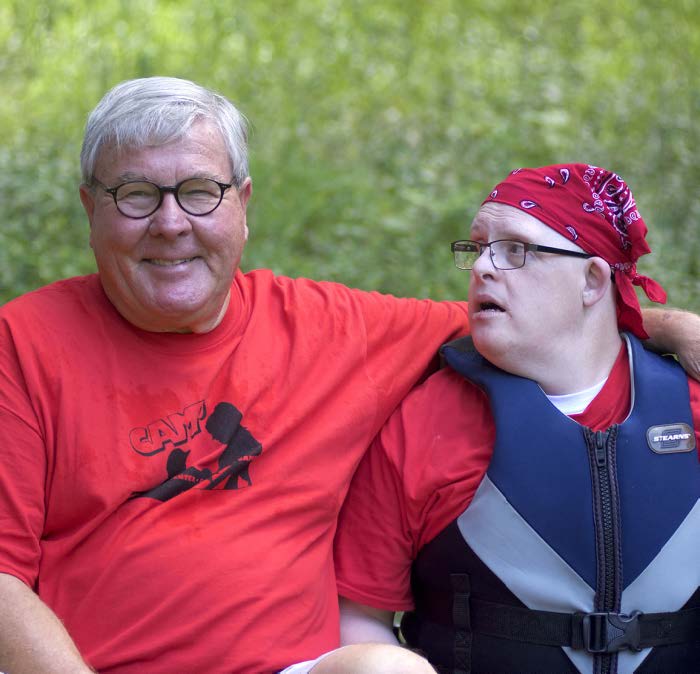
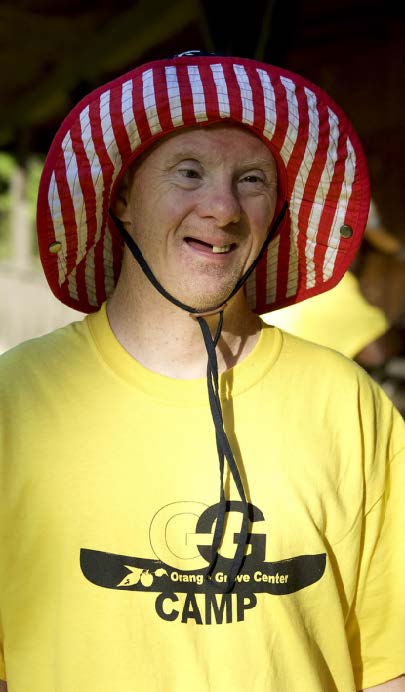
MAKING MEMORIES: Hal Baker (top left), the former Director of the Double G Camp, spends some time lakeside with a camper. "What occurs between camp activities are the relationships that develop between campers and counselors."
We have contacted counselors from each decade since the founding of Camp GG and asked how their experience affect them today. The Fifties and Sixties yielded the most transformative impressions; these were young people who for the most part weren't sure what they were getting into. Some were looking for summer work while some were talked into it by friends or family. One counselor from 1959 clearly admitted he was worried as a 16-year-old, but when he met the first camper, he would spend two weeks with the camper. He was changed completely into a friend for life. Another counselor from the Sixties said, when the session was over, he felt that both he and the campers were lucky to be alive after the shared experience.
Over the last several years, we have asked the counselors to share their impressions of camp so we could keep our efforts on track to make the sessions relevant. The comments we received were all about the relationships developed; some said that the cabins could use some air conditioning. One counselor from the Nineties stated that the relationships he forged at the camp carry over to this day. Another from the Eighties is an elementary school principal who admitted that he considers the campers he spent time with good friends that he sees often.
Raymond Duncan said, "A lot of parents pack up their troubles and send them off to summer camp." The parents of the Orange Grove Center never thought of their children as "trouble," they sent them to fish, swim, chase fireflies, dance and toast marshmallows and to form life-long friendships.
Here's how the math added up. The camp sessions were conducted for two weeks, they provided thousands of memories for hundreds of campers and counselors which lasted for over 60 years.
We will attempt to conduct the 63rd session of Camp Double G in Soddy Daisy TN on the shores of Lake Chickamauga in June. This will be an attempt due to the outbreak of the COVID-19 virus which caused the cancellation of last year's session after 62 years of continuous operation. Decisions can only be made with the understanding that utmost consideration must be given to the health and safety of everyone. •
ABOUT THE AUTHOR:
Hal Baker is the former Director of the Double G Camp, as well as the Deputy Director at the Orange Grove Center for several decades. He is presently an advocate at The Arc of Tennessee. He has been a dedicated professional in the field of developmental disabilities and is the former President of the Board at the Chattanooga Autism Center.